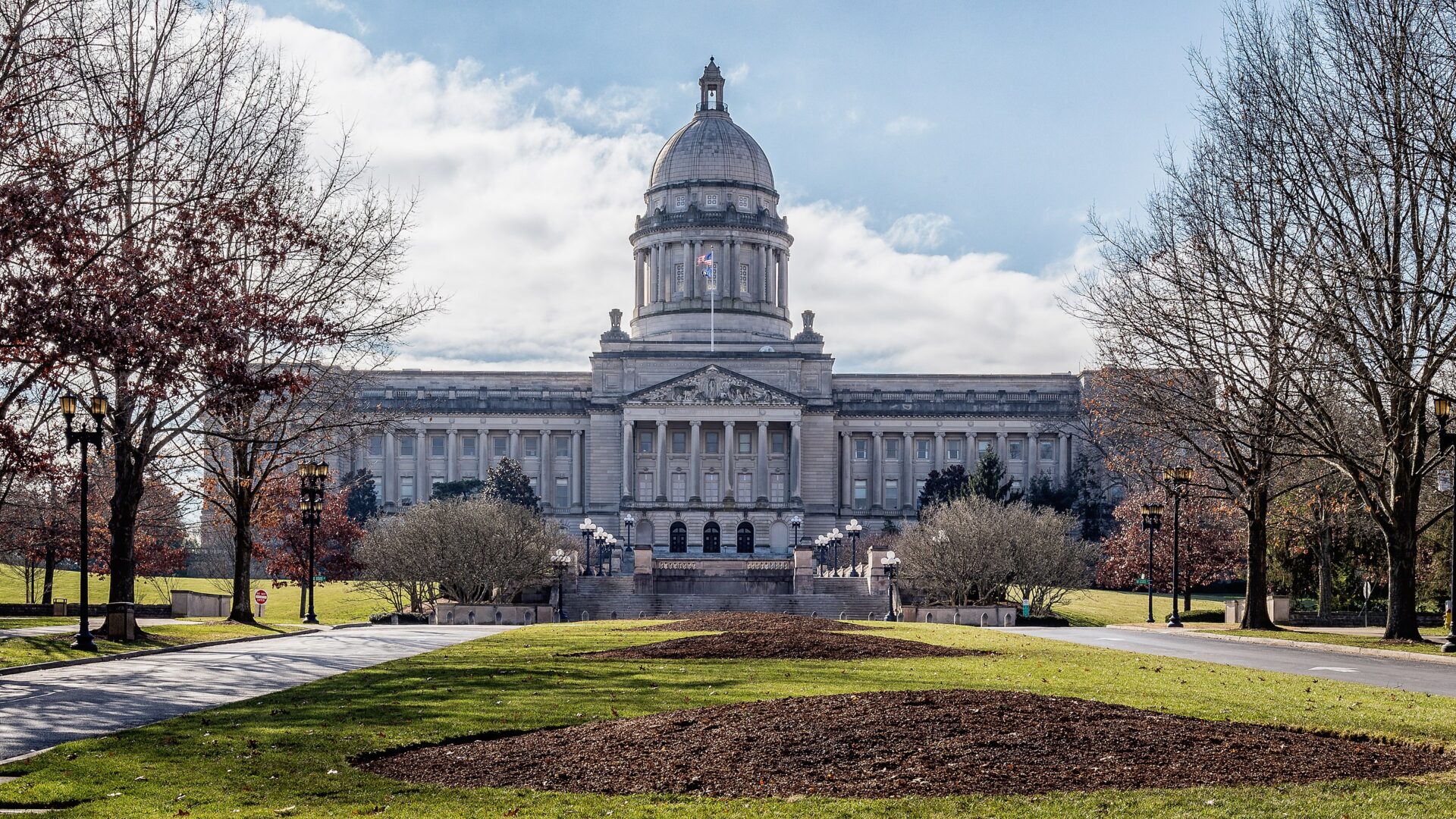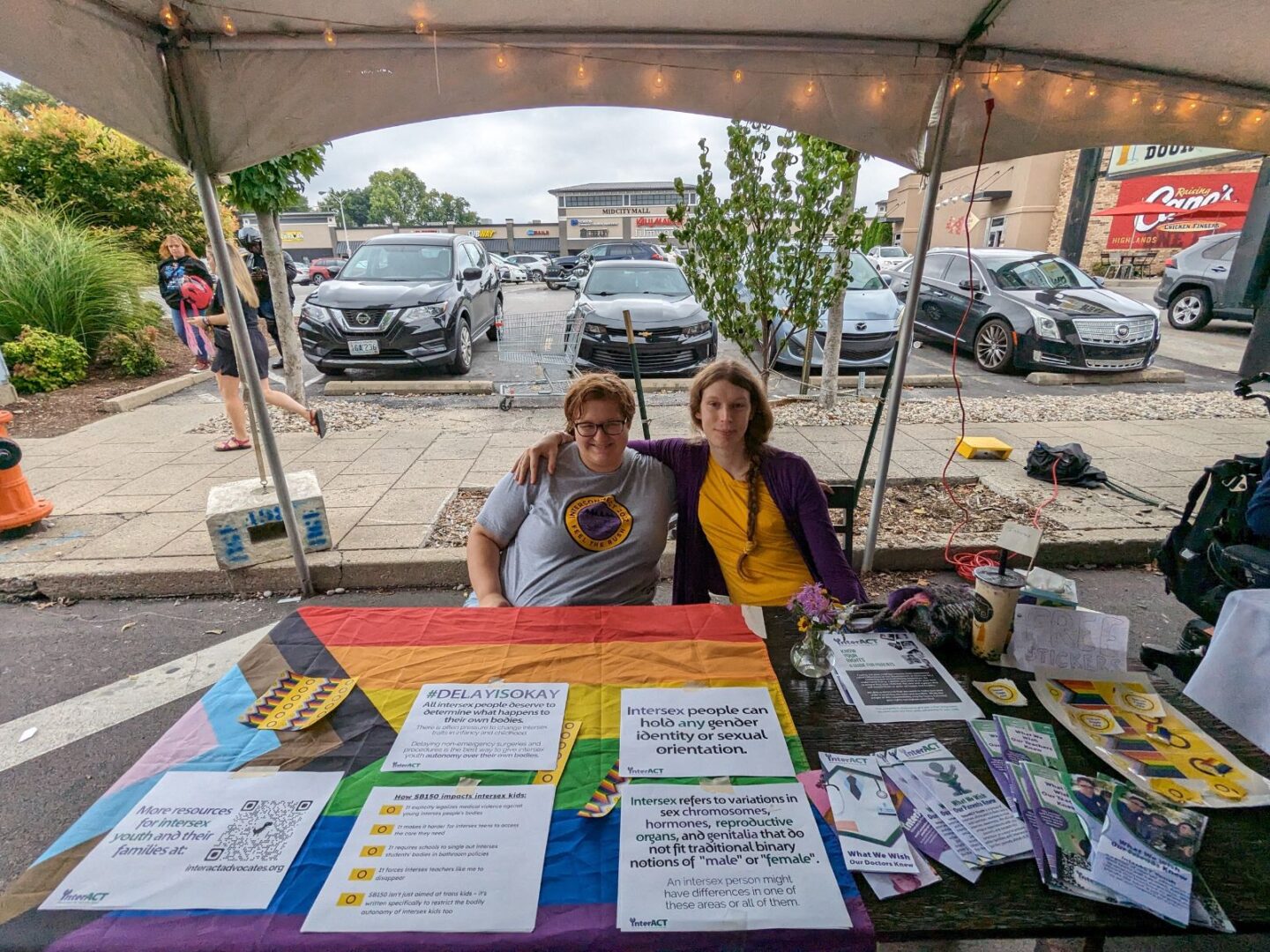The “worst anti-trans bill in the nation” is not only that.

Emory Hufbauer is a University of Kentucky graduate and a former high school teacher from Louisville, Kentucky. They work as a research programmer at a biology lab, and their pronouns are they/them.
Last year my state, like many in the US, passed a law that will affect the lives of people like me. It singles us out explicitly for our innate, harmless physical characteristics so that it can exclude us — from protection, from representation, from participation in society. The law codifies a veil of erasure already so complete that we can barely speak against it, and justifies itself on the appropriated stories of our lives. This is the violent censorship of our intersex existence.
Kentucky Senate Bill 150 has been called the worst anti-trans bill in the nation, but that’s an incomplete description of what it is: the most aggressive legislative circumscription of gender and sex in a century of US history. It is part of a wave sweeping the country, led by forces who believe in their own words that they are “warriors” fighting “under [God’s] wings” to protect “confused children” and society from a “gender ideology” that is not just “evil,” but “deadly to the culture.”
They have introduced hundreds of bills like SB 150 in 2023, in almost every state in the union, and dozens have passed. SB 150 is an omnibus bill, sewn together just hours before it sailed through both chambers of the Kentucky legislature, along with its book-banning counterpart SB 5. These laws are a tool of the most profound censorship, designed to protect the fragility of binary gender from the existence of people like me by binding and scattering our lives at every moment, from birth to the day we pass on the torch.
Not one Kentucky legislator thought it necessary to consult with an intersex person.
One of SB 150’s central provisions is a ban on any gender-affirming healthcare for trans teens, which proponents claim is necessary to protect them from “making mistakes” with their bodily autonomy — even when the teen and their parents, doctors, insurance, and therapists all agree, and every standard of informed consent has been met.
In contrast, I was coerced as a young intersex child into procedures that used hormones, surgery and psychological manipulation to permanently change my sex and gender characteristics against my will, and I barely survived. But because I am intersex, SB 150 would have offered me no protection had it been passed before I was born; in fact, it explicitly legalizes the terrible, purposeless harm that was done to my body in the name of assigning me a binary gender. Because I am intersex, I have no recourse to sue the providers who forcibly sterilized me as an infant, even as SB 150 grants expanded causes of action for 30 years to anyone who asked for and received safe, gender-affirming care as a teen.
From this unique perspective, I tried to raise my voice in opposition to SB 150. I emailed every member of the Kentucky legislature. I spent hours on the phone. I networked with allies and did my best to make my case on social media. I published an extended op-ed in the Louisville Courier-Journal, only to be censored by Facebook and Twitter; Google replaced the word “intersex” in searches for my article with “trans.” Not one Kentucky legislator thought it necessary to consult with me, or any intersex person, about how the bill they have passed would affect us.

The Kentucky State Capitol
As the bill was being debated, I traveled to Frankfort and sat in on the Senate Committee on Families and Children to try make my case in person. When it became clear that there would be no opportunity for my testimony on the bill to be officially heard, I took a deep breath. I waited until the chair was speaking, and then I stood up and took my place in the room. For ten seconds, I spoke over the Senator, my intersex androgynous voice carrying through the crowd, as level as I could make it, the loudest it had been in years. I said what I could before he remembered his gavel, and walked out ahead of security.
That was before they renumbered the bill, joined it with provisions that could prevent me from ever teaching again in Kentucky, and passed it the same day. It now bans everything from gender-affirming pronoun policies in schools to “any instruction…that has a…purpose of…studying…gender…or sexuality” without parental consent in advance.
Intersex children need to know they are beautiful and worth protecting.
When I taught high school, students asked me about my obviously divergent secondary sex characteristics, and if being different bothered me. Because of school policies, I had to avoid coming out as intersex or nonbinary, so I answered very minimally that my body is unique and I’m comfortable with that. Even so, the students understood by implication, and sometimes I overheard them talking about my gender. If a student came home talking about gender as a result of something I said in class, I could be breaking the law under SB 150. It will be almost impossible for me to teach again in Kentucky without constantly lying to hide the biological fact that I am an intersex person.
I did not learn the word “intersex” until I was 19 years old. And when I did I wept, because I finally understood how I belonged to humanity.
When I was a child, I thought I was alone. I was told that there was almost no one else like me, and that those few were ashamed. Because of the natural uniqueness of my body, for daring to not physically conform to the gender binary, I was harassed, threatened, assaulted, and medically violated throughout my childhood, but I did not learn the word “intersex” until I was 19 years old. And when I did I wept, because I finally understood how I belonged to humanity. If I had been given one glimmer of that reflection of hope and solidarity, even just a few years sooner, my life would have been uncountably changed for the better. The purpose of the “Don’t Say Gender” clause of SB 150 and the “Ban Queer Books” clause of SB 5 is to make sure that kids like the one I was never get that chance. Intersex is censored in classrooms and libraries and across the internet as an obscene concept unfit for children, but intersex children need to know that their bodies are beautiful, and worth protecting, and not obscene.
But that will be even harder when on top of censorship, bills like these attempt to physically erase intersex and trans bodies. Trans and intersex people were already banned from playing on most sports teams in Kentucky in 2022. SB 150 could make schools vulnerable to a lawsuit if any person’s sex is called into question while using a campus bathroom. This won’t just force schools to forbid trans kids from using their correct restrooms — it could also compel them to direct intersex children with certain variations away from student bathrooms entirely to minimize liability. As a young child, I was told part of the reason that I had to have surgery to change my body was because otherwise it would be too disturbing to the *other* children.
Every moment of our survival changes this world.
Every part of it is cyclic. What happened to me was possible because the censorship of intersex bodies from science for centuries meant that there was no evidence-based standard of care to treat me, and no policy to protect me. As people like me face medical violence, social isolation, and conversion therapy, have our most fundamental identities hidden from us, our lives scattered and our voices silenced, we can scarcely even protest against the harm done to us in the shadow of intersex erasure. In the silence of censorship, we are slandered, our stories appropriated, and the hostility to our existence codifies itself. This is the intersex cultural genocide: the systematic destruction and erasure of intersex from society, as a concept, as individuals, and as a people.
To the young people reading, I want to say one more thing: I love you, and this time will end. Every moment of our survival changes this world. Your lives are beautiful, and worth living.
interACT believes every intersex person deserves justice, and that only through ending interphobic legislation and intersex medical harm can we find justice under the law. Our work includes assisting the efforts of intersex activists like Emory, as well as engaging directly with policy makers. You can help create a different future for intersex youth by giving here.

Emory and their partner Madeline tabling for intersex rights at Louisville KY Pride






